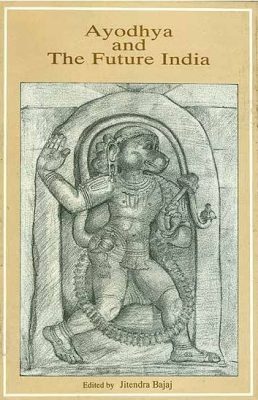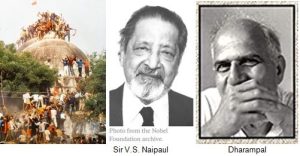6th December 2024 – On this day, 32 years ago, India took its first step toward Truth and Reconciliation. A big blow was given to a structure which stood as a blot for centuries which reminded Indians, particularly Hindus, of an era of barbarism, colonialism and uncountable atrocities which generations had to go through.
A section of Babri Masjid was demolished on 6th December 1992 the act of which laid the foundation to construction of Shri Ram Mandir in January 2024. More importantly, it also laid the foundation of the fact that now Hindus are ready to reclaim what is rightfully theirs.
The event has of course changed the Indian polity since. But it is even more interesting to know what people such as Dharampal, a stout Gandhian scholar and thinker and Sir V.S. Naipaul, a noble laureate said and wrote about this phenomenal event.
In his book, Ayodhya and Future India, which was published in the subsequent year (1993), Dharampal wrote, “The Ayodhya events signify the beginning of the end of a phase of Indian history.” He states further “Having taken over the levers and the trappings of imperial power in India the new ruling elite quickly convinced itself that the court-houses, the circuit bungalows and the magisterial residences built by the British, as also the various manuals and codes of departmental and courtly procedure, created by them and the earlier Mughal rulers, were essential to the governance of the Indian people. Even the symbols of Indian defeat became the treasured inheritance of the Indian state.”

Picture Source: Exotic India
About the demolition, he said that the event has “broken the reverie”. He further stated, “The Ayodhya events’ have shown that the people of India have not given up. They continue to keep their own counsel about what is worth preserving in the Indian past and what needs to be forgotten. And, thus they have forced us to begin thinking beyond merely finding ways of somehow carrying on with the mantle of the dead and departed imperialists.”
Sir Vidiadhar Surajprasad Naipaul, a renowned author and Nobel laureate, did not consider the Babri Masjid demolition as an act of revenge. After his trip to Southern India and Orissa (now Odisha), he saw the ravages of the Muslims on the confident Hindu culture of those places1 and said, “I saw these very fine structures which were to some extent desecrated and debased.” He felt that the response of that culture had been withdrawal; an inability ‘to enter into its own defeat’; he felt it had been a response akin to that of Rome after the tribal invasions.”2
In further remarks about the events that took place on 6th December 1992 in Ayodhya, he considered these actions as a “creative force” and a “necessary corrective to history”. He applauded the act and called it an “act of historical balancing”.3
He did not see “these events purely in terms of one fundamentalism pitted against another. Only now are the people beginning to understand that there has been a great vandalising of India. Because of the nature of the conquest and the nature of Hindu society such understanding had eluded Indians before.” 4
An era of revival began on that day. The India identity, more so the Hindu identity, found its lost voice.
Featured Image: Nobel Prize Society and Exotic India
- https://www.indiatoday.in/magazine/up-front/story/20121119-v-s-naipaul-girish-karnad-babri-masjid-demolition-760503-1999-11-29
- Ibid
- https://time.com/5367849/vs-naipaul-legacy-reactionary/
- https://x.com/indologia/status/1864925441099710557

